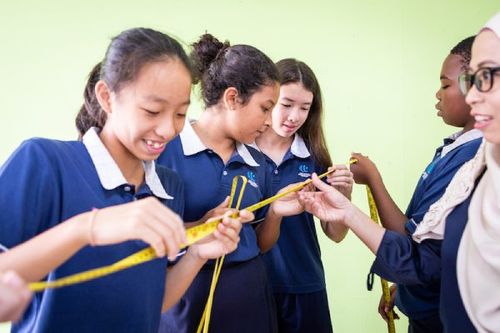What is the Classroom Economy?
The classroom economy is a long-term simulation exercise in which a micro-economy is created within the classroom environment. With its simple principle and adaptability, this programme can easily be incorporated into any classroom at any level. The programme’s objective, regardless of the grade level in which it is implemented, is to teach the basics of financial responsibility and introduce students to the concept of delayed gratification.
At OWIS, I use the classroom economy programme for my Grade 2 class, that is designed to mimic real-world economic activity. Students create classroom jobs and earn a salary, and with the income they earn, they create a budget and learn how to balance a bank account. Through these tasks, students begin to discover for themselves that every decision has an opportunity cost.

Benefits of the Classroom Economy
- They are earning rewards for completing their tasks correctly. Not only will they earn their assigned salary for a job well done, but they enjoy the personal satisfaction that comes with helping to maintain the classroom.
- The experiential activities involved in the classroom economy teach 21st-century skills that students will retain throughout their lives. In addition to learning the basic principles of fiscal responsibility, students also begin to understand the value and importance of saving and the benefits of delayed gratification.
The Classroom Economy Tool-Kit
Creating a classroom economy tool-kit is actually quite simple. All you need is a set of pretend money. This money is used to provide students with their income, and then, in turn, they can either save their money for an auction at the end of the month or spend their money to rent items in the classroom. For instance, a student may opt to rent the iPad for a specific period of time or rent time to relax on the classroom couch. By giving students the freedom and flexibility to use their income as they choose, they learn to understand the concepts of budgeting and the importance of saving for what they want and need.
Job Ideas for the Classroom Economy
At OWIS, we give our primary students the opportunity to create their own classroom jobs as part of the classroom economy project. These are a few of the job ideas that our students have come up with:
- Line Monitor — The line monitor makes sure that all classmates stay a metre apart in line and wait quietly.
- Play Police — The play police officer ensures that all students are wearing their masks properly and maintaining a safe social distance.
- Book Boss — The book boss works to keep all of the classroom books organised. This student is responsible for handing out and collecting books.
- Kindness Captain — The kindness captain takes notice when other classmates go out of their way to be kind.
- Noise Warden — The noise warden is responsible for keeping the classroom calm and quiet.
- Banker — The banker handles all monetary transactions conducted as part of the classroom economy.
- Teacher Assistant — The teacher assistant helps the teacher with various tasks throughout the day.
The classroom economy is an innovative, experiential learning opportunity for primary school students. Through this activity, students become curious about money and the economy, and they begin to discover the basics of fiscal responsibility. In addition to helping students develop a healthy, balanced approach to spending versus saving, this on-going activity is enjoyable and memorable for all involved.
Has your child participated in a classroom economy before? I would love to hear more about what they liked best about this hands-on learning experience. Follow OWIS on social media and comment or tag us in your posts related to your child’s classroom economy experience.
(All OWIS photographs in this blog article were taken pre-Covid. The school is adhering to hygiene protocols and social distancing measures as recommended by the CPE and Ministry of Health, Singapore.)
(This blog was originally written in collaboration with Mr Braden Cobb, former Primary School Teacher, OWIS Nanyang.)














